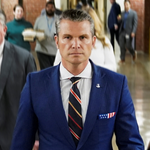Coming into his acceptance speech last night, John McCain had to face two comparisons he couldn’t possibly win: He couldn’t outdo Barack Obama in speaking ability or eloquence, and he couldn’t match Sarah Palin’s success at firing up partisan passion. So maybe it should come as no surprise that he ended up doing neither. The speech he delivered was beset with technical problems (another green background! What were they thinking?! Oh, they weren’t). It suffered from delivery problems and awkward pauses — at one point, he seemed to say Sarah Palin “worked with her hands and nose.” And as Peter Keating wrote earlier, the text “had a next-to-last-draft feel to them: overly specific in spots, distressingly vague in many, many other passages.” The political commentariat, as a result, was largely left underwhelmed.
• Mark Halperin gives McCain a B+ for a “simply fine and solid” speech. [Time]
• Ros Douthat thinks it was a “strong speech” that was “delivered somewhat flat.” [Atlantic]
• Josh Marshall says that while there were no embarrassing flubs, it was surprising that “it actually wasn’t a very good speech” as far as the writing and content was concerned. [TPM]
• Rich Lowry “wasn’t bowled over by it,” as it lacked substance and “simple, stark policy proposals.” But he’s “still encouraged.” [Corner/National Review]
• Clive Crook writes that even allowing for an expected oratory gap with Obama, this speech was “disappointing.” More detail was needed and more focus on issues that matter to centrist voters. [Atlantic]
• Franklin Foer calls the first half “horrible,” but when it turned to his biography, it was “extremely powerful.” Which means all in all, it was a “mediocre effort.” [Plank/New Republic]
• Mickey Kaus wonders if Mark Salter was off “vetting failed VP candidates” during the “first 4/5 of the speech.” Overall it “reeked of extra cooks making too many unintegrated additions,” which raises questions about McCain’s managerial abilities. [Kausfiles/Slate]
• Andrew Sullivan thinks McCain “seemed tired” and offered vague specifics and “a kind of strained, exhausted mildness.” [Daily Dish/Atlantic]
• Jay Nordlinger thinks some of the speech was “Platitude City” and some was “moving,” but overall the most you can ask of a candidate “is that he be himself, that he be honest, that he say what he believes,” and that’s what McCain did. [Corner/National Review]
• Jonathan Cohn contends that if “this was McCain’s answer to voter anxiety about the economy, it wasn’t too impressive.” Besides “noticing” people’s struggles, McCain didn’t offer much help. [Plank/New Republic]
• Walter Shapiro finds it an “imperfect speech” that may still “appeal to the voters he needs to win, especially an older generation in hard-pressed normally Democratic industrial states like Michigan and Pennsylvania.” [Salon]
• John Podhoretz maintains the speech was “designed to demonstrate McCain’s unusual blend of personal heroism and history as an unconventional politician,” and in that respect “it was very successful.” [Contentions/Commentary]
• Eve Fairbanks believes the speech worked very well: plainspoken, unadorned, reassuring, and classy. But she was listening on the radio. “[I]t was funny how many of the burdens that John McCain bears melted away without a visual feed.” [Stump/New Republic]
• Andrew Romano thinks the speech “did what it had to do — nothing more, nothing less.” Though the speech lacked “an overarching message,” McCain described his personal story in “humble, human tones that will appeal to those who haven’t yet heard it.”
[Stumper/Newsweek]
• Steve Benen says McCain “had a handful of key tasks he needed to do last night, and didn’t complete any of them.” [Political Animal/Washington Monthly]
• Daniel Casse says it was an “extremely patriotic speech about national restoration — and a remarkable reminder of the kind of person McCain is,” but wonders whether it was enough. [Contentions/Commentary]
• Chuck Todd and friends write that “[i]t appears the campaign decided it simply needed to get through it — there wasn’t anything new, except a longer description of his POW days.” [First Read/MSNBC]
• Megan McArdle believes “the actual policy/issues content could have been taken straight from the RNC! Greatest Hits 1980-2004 compilation album,” with McCain’s “main contribution” being “the shocking revelation that…he was a POW.” [Atlantic]
• Jonah Goldberg: “Ehhhhh…” [Corner/National Review]
Related: Giuliani Softens Up Democrats for Powerhouse Palin
For a complete and regularly updated guide to presidential candidates Barack Obama and John McCain — from First Love to Most Embarrassing Gaffe — read the 2008 Electopedia.





























